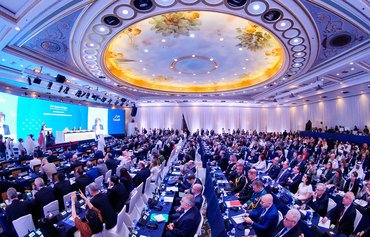Participants at the recently concluded Manama Dialogue 2016 regional security summit stressed the need to improve joint regional security co-ordination to meet the growing challenges precipitated by geopolitical unrest.
The 12th annual summit, convened by the International Institute for Strategic Studies, brought 500 security and diplomatic figures from 20 countries together in Bahrain from December 9th to 11th.
Participants discussed the situation in the Middle East, the expansion of regional security partnerships and how to navigate the changing regional variables.
They unanimously agreed on the importance of reaching a common understanding to commit to the eradication of terrorism, and the "Islamic State of Iraq and the Levant" (ISIL) in particular.
It will be important to stem all forms of extremism and violence and prevent these groups from recruiting youth to carry out inhuman crimes, they said.
Stemming Iran's expansionist ambitions
Arab League secretary general Ahmad Aboul Gheit called on the Iranian regime to stop its expansionist policies and its interference in the region's affairs, saying it should be prevented from acquiring weapons of mass destruction.
Iran should start respecting the sovereignty of the other countries to keep the stability and security mechanism of the entire region intact, he said at the summit.
"The Iranian threat stems from wrong and bad policies, which will inevitably have repercussions on its interests in the region and the world in general," former Egyptian Foreign Minister Nabil Fahmy told Al-Mashareq.
The Gulf states’ efforts to counter Iranian interference are headed in the right direction, Fahmy said, but further co-ordination is needed to address its expansionist ambitions in Iraq, Syria, Lebanon and Yemen .
Dialogue and co-ordination among Arab states are more urgent than ever, he said, adding that there ought to be a comprehensive vision that takes into account all political, diplomatic, economic and security issues.
In addition to the co-ordination and good relations between Arab states and foreign countries, he said, "it is imperative to strengthen and develop Arab and national capabilities in the area of national security".
This is necessary because "over-reliance on others creates a political and security imbalance", he said.
Addressing the Syria crisis
"The Manama Dialogue provided us the opportunity, as [Syrian] opposition forces, to present our point of view," said Najib Ghadbian, special representative to the US for the National Coalition of Syrian Revolution and Opposition Forces.
Ghadbian described the current situation in Aleppo as a "heinous crime against humanity", adding that the "Manama Dialogue is an effective conduit to deliver the Syrian message".
New: "Iran is an occupying force in Syria," he told Al-Mashareq, adding that "those who are killing the Syrian people in Aleppo are sectarian militias trained and armed by Iran" and its Islamic Revolutionary Guard Corps, with Lebanon's Hizbullah also playing a role in that situation.
"There is a new opportunity for Gulf-Arab action to raise the issue of Iran’s constant meddling in the affairs of neighbouring countries," he said, noting that coalition forces are fighting the Iran-backed Houthis (Ansarallah) in Yemen.
"This is the right time to hold a regional conference to discuss the situation in the region in a deliberate fashion," said former vice president of Iraq Iyad Allawi.
The countries of the region are "exhausted and weakened" by the prevailing bloodshed and chaos, he said, and are seeking solutions to these issues.
Towards Iraqi reconciliation
Regional security is not achieved through military efforts alone, but through meetings and dialogue, Allawi said.
He urged the Iranian regime to be "either a positive player and work with others, or be isolated", calling on it "to be part of the peace and stability in the region".
"The battle against the terrorist group ISIL in Mosul presents a great opportunity for Iraqis to build a historic national reconciliation, abandon the sectarian quota system and work towards building and stabilising the region," he said.
Winning the war on terrorism and extremism can only be achieved by changing the political environment and making it inclusive of all components of Iraqi society, Allawi said.
This will help Iraq repel terrorism, he said, as extremist ideology cannot thrive in a society that is free of sectarianism, marginalisation and exclusion of others.

![Participants at the Manama Dialogue 2016 conference, held December 9th to 11th, agreed to boost security co-operation. [Mohammed al-Jayousi/Al-Mashareq]](/cnmi_am/images/2016/12/21/6845-Bahrain-Manama-conference-600_384.jpg)







Bahrain has to recruit a large number of army and security personnel to protect the country and borders against terrorism and extremism. Now, all the world is recruiting large numbers to preserve security.
Reply1 Comment(s)